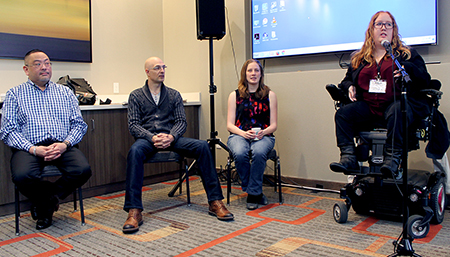Panel Summaries

Panel of Engineering Students and Professionals with Disabilities
Panelists included Cindy Bennett, University of Washington; Matthew Mack, Microsoft; and Michael Villanueva, Boeing.
In your education or career, how have you seen disability been integrated into engineering? Or where did you notice it missing?
- Emphasizing the importance of accessibility. My company has been strong in accessibility, though we have had challenges. How do we ensure our teams address accessibility in every product? It can sometimes be a complete blind spot. Accessibility isn’t mainstream – most people don’t have experience with accessibility. Assistive technology needs to be taught at the educational level.
- When designing new products, unless there is a person with a disability or who has been trained in accessibility, accessibility is often not considered. Can we all be trained in empathy for a variety of users?
- Even in an environment focused on diversity, disability is still often forgotten and ignored. There needs to be more visibility of disability, including more students and more faculty with disabilities. Empathy requires establishing a rapport with people with disabilities—a one off meeting won’t necessarily make a student remember to include disability, but making a relationship with someone with a disability might.
- Accessibility should be taught in all classes. Accessibility should be required to be included in projects and all classes.
Do you use accommodations? What are those accommodations?
- I use a few different screen readers, and I also read braille in print and on a braille display. I also sometimes use a human assistant, for example, to make sure I format my PowerPoint slides correctly.
- I don’t want an interpreter—I just wanted to be included. I usually Skype into meetings, so I can turn the volume up.
What is a faculty member’s role in accommodations?
- I sometimes go without if I don’t want to jump through the hoops to get my accommodations. Some students may not know what they need. As a faculty member, when you get a letter about a student’s accommodations, start a conversation with the student. Working together to find solutions will help the student be successful.
- Students don’t want to stand out or feel different. Make a statement about disability as a part of diversity. Teach in as accessible manner. If you can make it easier for a person with a disability, it’s only going to make it better for everyone else in the class as well.
- Faculty should act as mentors and advocates. Familiarize yourself with existing resources and advocate for additional resources as needed.
- Accessibility shouldn’t be seen as a burden. Students should be able to work towards their full potential rather than spending their time solving accessibility problems. Faculty should work to make sure students aren’t confronting roadblocks.
- Some faculty think industry won’t provide disability-related accommodations to employees. In reality, this isn’t true and many companies value employees with disabilities. Faculty need to know this.
- I worked hard and yet I wasn’t encouraged to pursue engineering. If I had listened, I wouldn’t be where I am today and my company would be worse off. Faculty should be encouraging their students and thinking globally about how to include diversity.
How do you quickly give someone the skills to solve a problem, especially concerning accessibility?
- Disability is still a niche—students are not thinking about accessibility. Faculty can give students the tools to address accessibility issues. Normalize the practice of accessibility.
- We need to stop telling people that accessibility is hard, because the mindset should be that accessibility is easy.
Accommodations can often be seen as giving someone with a disability an unfair advantage. How can we promote the idea that accommodations merely level the playing field?
- Provide training in unconscious bias. Explain how accommodations create access. People with disabilities just want equal access.
- Accommodations can then be seen as a handout, when they aren’t—they are just creating an environment where everyone can engage.
- I don’t have the ability to work at a physically-demanding job; my most valuable asset is my mind. STEM education allows me to use my mind to be a productive member of society.